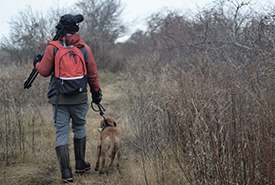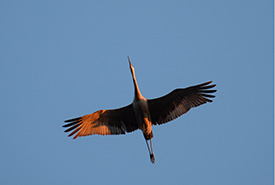Reflections from 500 days of birds: A story of citizen science

Me and my birding sidekick (Photo by Jodi Elchyshyn)
Following the announcement of the COVID-19 pandemic in early March 2020, many of us faced new challenges during these unprecedented times. As a recent graduate and working biologist, I was lucky to be able to work remotely from my apartment in Elora, Ontario. The first few weeks of remote work and lockdown measures were an adjustment, but a seemingly miniscule one given the drastic changes that so many others around the world were going through. My workdays felt isolated and gloomy until I had an uplifting reminder: I now had an opportunity to walk the dog and scan the neighbourhood for a few of the brave and long-staying songbirds, wintering finches and roaming waterfowl. On a cold winter morning on March 25, 2020, without a second thought, I began my 500 days of consecutive birding (and counting).
As is the case for millions of people around the world, birding is a favourite pastime of mine that was enhanced during the pandemic for many personal reasons (little or no commute time) and societal measures (public safety stay-at-home orders). However, data collected by birders has not only contributed to personal gratification, but it has important conservation benefits, such as with the world-renowned collaborative science project eBird. Many readers here may be aware of the collection and use of data by sites such as eBird and iNaturalist (be sure to explore these if you haven’t). But the impact as a citizen scientist may be considered a runner-up prize to the personal satisfaction that a birder may experience by documenting their birdwatching efforts.

Sandhill crane flyover (Photo by Josh Pickering)
For those who contribute their sightings and efforts to eBird via their personal account, the user-friendly site provides data summary tools that allow you to challenge yourself and others to further explore and observe birds in nature. Since my current streak began on that cold Wednesday morning in March 2020, my eBird summary data reports that I have observed 244 species of 90,186 individual birds, 20 of which were new to me in Ontario. Of the many birds seen and heard, rare vagrant bird species such as the swallow-tailed kite and snowy egret are notable highlights for me, particularly because I was able to share my excitement for these birds with my family and friends. However, my all-time favourite sighting was of a local eastern screech owl, which I frequently observed on my daily walks through the neighbourhood. I often found it sitting quietly in the morning sunrise or calling loudly in the late evening. Almost every sighting has a story, but for me the most memorable ones are shared with friends or that are found in your own backyard.
On August 6, 2021, I surpassed 500 consecutive days of submitting an eBird checklist, totalling over 480 hours of birdwatching; an average of almost 29 minutes a day in this time span. I submitted checklists from 35 counties in Ontario, with a total travelled distance of almost 1,200 kilometres (mostly by foot around my own neighbourhood). For this, and many more insights, I am thankful for the power of citizen science tools, many of which are a driving motivator for me to continue to experience the natural world around me. Whether it is birdwatching or something else entirely, I challenge myself to do something everyday that enhances my own connection to the natural world, as I hope you have the opportunity to do so, too.


